Haim look back at their first decade: 'No-one wanted to sign us!'
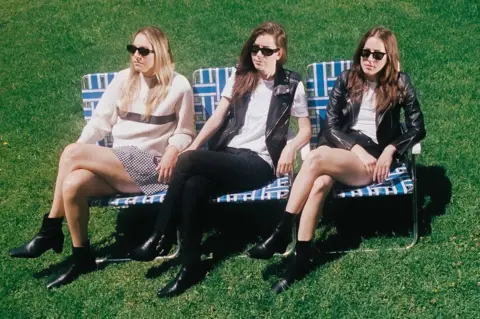 Terrence O'Connor
Terrence O'ConnorEleven years ago, on a cold and dark December evening, I squeezed into an anonymous dressing room at the O2 arena for my first interview with Haim.
They didn't know it at the time, but the group were about to win the BBC's Sound of 2013. My job was to profile the band, without giving away the secret.
As we spoke, Florence + The Machine started playing in the auditorium above our heads. The walls shook, a guitar case fell over. We exchanged nervous glances.
"The worst part is," said bassist Este Haim, "no-one is going to remember that we're in here.
"It's going to be the saddest BBC poll ever. 'They would have got to number three but they unfortunately passed away at the O2 arena'."
Thankfully, the seismic activity subsided and Haim lived to tell the tale. They won the poll, celebrating with a victory dance at Madame Tussauds, and went on to become one of the world's biggest bands.
Their latest album, Women In Music Part III, was nominated for album of the year at the Grammys, and they've just been whisked around America by Taylor Swift as the support act on her Eras tour.
We meet again this August, a day after the trio's headline set at London's All Points East festival.
"I cried through the first three songs," admits Alana, the youngest Haim sister, who's also a Bafta-nominated actress for her role in Licorice Pizza.
The concert was an emotional homecoming for the band who, despite hailing from California's San Fernando Valley, were signed to the UK's Polydor Records in 2012 after every American label passed.
This year marks the 10th birthday of their debut album Days Are Gone and, with an anniversary edition pushing it back into the Top 40, I sit down with Haim to recall the protracted sessions that led to the record - and to finally admit my decade-long duplicity.
"You knew we'd won the whole time? Oh my God, that's hilarious," laughs Danielle.
"I feel like we blinked three times and 10 years passed," adds Alana. "Or maybe that's just the jet lag?"
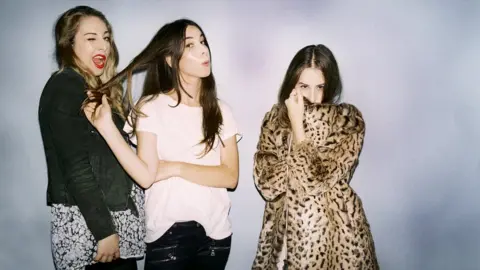 Polydor Records
Polydor RecordsIs it true you played your first gig on 7 July, 2007 - the same night as Live Earth?
Danielle: That's right! We made jokes about it all night.
Alana: "Hello! This is Live Earth! Let's take it back to the Valley and see what our friends over there are doing."
How did you end up taking six years to make an album?
Danielle: We did what a lot of bands in LA do, and played around locally.
Alana: We played every parking lot, every venue, but no-one wanted to sign us.
Danielle: By the fourth year, we were having to beg our friends to come. Texting everyone, "please come and pay $10 for the show".
How hard was it to keep going?
Alana: It honestly wasn't that frustrating. Our dream was just, play music and get out of town, and we always believed it was going to work out. I don't know why, we just did.
Este: I mean, you dropped out of college...
Alana: My parents fully sat me down and were like, "What are you doing? If this doesn't work out, what'll you do?"
Este: And we all had jobs. Alana was a nanny, I worked in every restaurant in LA, and then Danielle was off traipsing around the world [playing guitar for The Strokes frontman] Julian Casablancas.
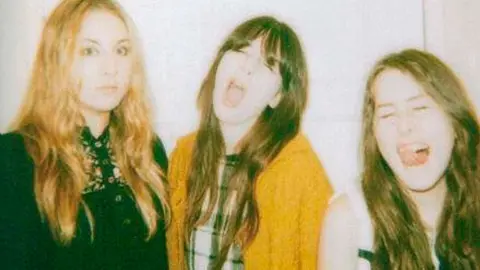 Haim
HaimYou once said you threw away 10 EPs of material.
Alana: Just [2013 single] The Wire alone, I think there are 30 different versions.
What was going wrong?
Alana: We had no idea how to record our songs. We knew exactly what we wanted them to sound like in our mind, but it never turned out right.
Este: We were sold a lie, though, because we would watch those Behind The Music documentaries.... Tom Petty would be at Sound City and he'd plug in his guitar and go, "Then we wrote American Girl." Like it's that easy!
Danielle: So we'd save up all our money every year and go to these really nice studios in the Valley for 48 hours and we'd try to record five songs, just by setting up in the room and playing. But I didn't know about mics or EQ or anything.
But you eventually worked it out?
Alana: In the movie of our lives, the day that Danielle bought Garage Band is the day that Haim started.
Danielle: Suddenly, I realised, oh my God, I can put reverb on this guitar or, I can pitch up this handclap so it sounds brighter. Just trial and error, but it was so eye-opening.
How much of the album was written in that time?
Danielle: We wrote The Wire in 2008, so that was already there, but most of the record, if not everything else, came in that two-year period of [saying], all right, we've got to get better.
Alana: There was a lot of trial and error.
Danielle: Because we hadn't broken through, we intrinsically thought, look, we can play really well but it's not going to mean anything if it doesn't sound different to anyone else.
Alana: To our credit, we knew even then that the internet was forever, so if we were going to put our name on something, it had to be right.
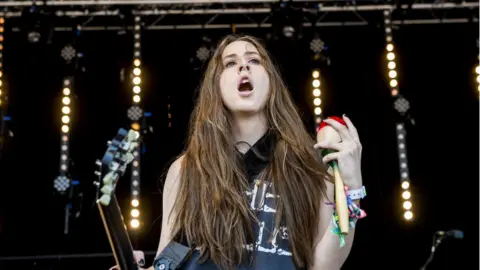
You put out an independent EP in 2012, and suddenly UK radio was playing it. How did that happen?
Este: I don't know! We'd only released it a couple of weeks before to our friends. It was that magical internet time where putting stuff online got us noticed.
Alana: I mean, we had two people at our shows in America.
Este: And they were our parents...
Danielle: But when XFM started playing us, we were like, maybe we should go to the UK?
Had you been before?
Danielle: I had, because I'd played some gigs with Julian - but I couldn't believe that I was here with this band.
So was Danielle the tour guide?
Este: Oh yeah. She was like, "That's what they call 'the Tube' but it's really just the subway."
Danielle: And also, knowing The Strokes' story, they broke here first, too. It felt like a really cool trajectory for an American band, so we signed with Polydor.
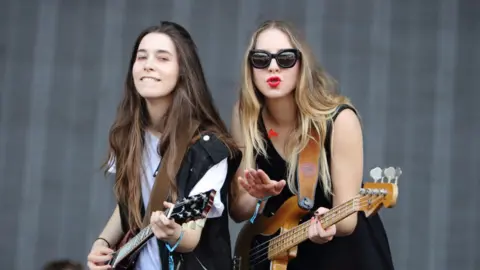 Getty Images
Getty ImagesLyrically speaking, the album has a lot of relationships-on-the-rocks songs.
Este: Oh yeah.
Daniele: But it's really just about growing up.
Alana: It's all those things you go through in your late teens and early 20s, when you're still figuring things out. I think that's why we were also being very particular about the music. We were like, if we're going to put this album out, it's got to be 100% us. Even the photo was taken in my parents' back yard.
What were your expectations when it came out?
Alana: I remember we had a bottle of champagne that we got at a corner store and, very cinematically, at midnight, we went out on the street and let the champagne go!
Danielle: We weren't thinking about chart positions. It was more like, we had this small fanbase and we wanted them to like it, because there are a few left-turns on there.
And then it beat Justin Timberlake to number one!
Este: We were just as shocked as you were.
Alana: I grew up wanting to marry him!
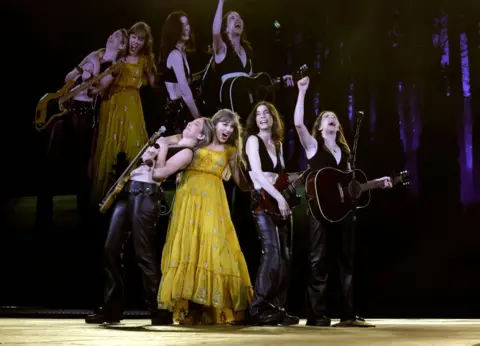 Getty Images
Getty ImagesNow you're headlining festivals and playing with Taylor Swift. Are there still new fans coming on board?
Alana: Yeah, this summer has been crazy. It's insane. So many people.
What's it like up on those stages?
Alana: Honestly, it feels like a video game. You're like, is this real?
Este: You have to disassociate a little bit. Because if you really try to comprehend what's happening, there's 80,000 pairs of eyes on you. That's crazy.
How do you connect with that many people?
Danielle: One thing we learned is that, from the second you step on stage, you have to bring them in. You fight for their attention.
Este: You've got to play your ass off. And then you get to watch Taylor's show, which is amazing.
You've got the golden ticket.
Este: It's amazing! You do a 30-minute set, wash your face, or not, then go out in the audience and have the night of your life.
